

|
 |
Hardware
R2 - United Kingdom - Network Review written by and copyright: Paul Lewis (21st February 2009). |
|
The Show
 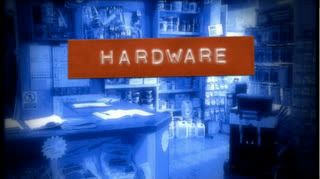 Produced for Thames Television and broadcast on ITV, Hardware ran for two series between 2003 and 2004. Created by Simon Nye, the series shares with Nye’s other major situation comedy Men Behaving Badly (Thames, 1992-4; BBC, 1995-8) a focus on male friendship. Nye’s Men Behaving Badly is often discussed simply as a symbol of the ‘New Lad’ culture of the 1990s (see Davies, 2001: 120; Page et al, 2004: 158; Boyle, 2005: 186-7; Whannel, 2002: 76). However, despite this reductive view of his most famous television work, Nye is something of a polymath: Men Behaving Badly was adapted from Nye’s first novel (of the same title), published in 1989; Nye has also scripted several ‘straight’ adaptations of works such as The Railway Children (Carlton Television, 2000). Further to this, Nye is also very familiar with the conventions of absurdist theatre, having worked as a translator on plays such as Dario Fo’s political satire Accidental Death of an Anarchist (translation: 2003) (see Nye, 2003: en). (Characteristically lacing his reflections on Fo’s play with pop culture references, Nye justified his decision to relocate the play from 1960s Italy to contemporary Britain through asserting that ‘The play is about the murder of an innocent man, not how amusing bushy sideburns and large Sophia Loren-style glasses now look’; ibid.) 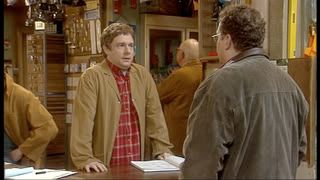 Predominantly set in a hardware shop, Nye’s Hardware featured one of the stars of BBC’s celebrated sitcom The Office (2001-3), Martin Freeman, alongside a host of other actors familiar from earlier situation comedies, including Peter Serafinowicz and ‘Allo ‘Allo!’s (BBC, 1982-92) Ken Morley, Freeman plays Mike, who along with Kenny (Serafinowicz) and Steve (Ryan Cartwright) works in Hamway’s Hardware, which is managed by Rex (Morley). Most episodes feature a balance of scenes set in the shop (showing the interactions between this group of male friends and colleagues, and the customers they have to deal with) and domestic settings, including Mike’s homelife with his girlfriend Anne (Susan Earl). Another recurring location is the nearby Nice Day Café, where Anne works as a waitress. In the wake of such experimental situation comedies as The Office, Spaced (Channel 4, 1999-2001) and I’m Alan Patridge (BBC, 1997, 2002), at the time of its original broadcast Hardware seemed like a throwback to an earlier era of situation comedy. Where The Office and I’m Alan Patridge adopted a postmodern ‘mockumentary’ approach to their subject matter, Hardware was a traditional studio-based sitcom, complete with a laugh-track and an emphasis on pratfalls. The casting of Freeman encouraged some critics to unfavourably compare Hardware with The Office, leading to The Observer’s Stephanie Merritt wondering what attracted Freeman to Hardware’s more conventional sitcom format; Freeman’s response was that the scripts simply ‘made me laugh’ (Freeman, quoted in Merritt, 2004: en). Prior to its broadcast on ITV, Hardware also suffered somewhat from the perception of Nye’s Men Behaving Badly as nothing more than a ‘new lad’s sitcom. In an article for The Observer, Kathryn Flett somewhat dismissively referred to Hardware as ‘effectively a blokeish Open All Hours set in an overstaffed hardware shop’ (2004: en). Interviewing Martin Freeman for The Guardian in 2003, Zoe Williams similarly asserted that prior to watching Hardware she was ‘suspicious of it’ due to its assumed male bias, noting that ‘I was unfamiliar with the rude-hardware-shop comic trope, being a bird’ (en). Williams also confessed that she initially dismissed the series because ‘it's written by Simon Nye, and I always think, "Oh, Men Behaving Badly, prime-time horse-unfrightener, yik yak yik yak" and forget how outstanding his stuff is’ (ibid.). 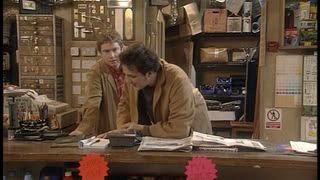 Admittedly Hardware’s studio-based approach to the sitcom format seemed at the time of its broadcast almost quaint, coming as it did at the height of the popularity of postmodern ‘mockumentaries’ such as The Office and surreal satires like Nathan Barley (Channel 4, 2005) and The League of Gentlemen (BBC, 1999-2002). However, as Williams suggests in her interview with Freeman, it’s easy to underestimate Nye’s work. Utilising a familiar approach to the sitcom format, through keen observational humour Nye dissects the type of male camaraderie that develops in some workplace contexts, especially amongst shop staff; the accusations of ‘laddishness’ are, at least in the case of Hardware, a rash generalisation. Whilst Hardware could never be said to break new ground in the format of the television situation comedy, its back-to-basics approach was perhaps surprisingly a little ahead of its time, predating the return to studio-based sitcoms that followed the unexpected success of Graham Linehan’s The IT Crowd (Channel 4, 2006- ) (see Yentob, 2006: en). Writing for the Media Guardian’s website in 2008, Ben Dowell notes that the traditional studio-based sitcom suffered a hiatus between One Foot in the Grave (BBC, 1990-2000) and The IT Crowd (np). Noting Victoria Wood’s assertion at the 2005 British Comedy Awards that ‘the sitcom is dead […] The likes of The Office are so good that you can’t go back’, Dowell asserts that the studio-based sitcom has surprisingly acquired a new lease of life; citing the BBC’s commissioning head Lucy Lumsden, Dowell notes that ‘The IT Crowd changed things […] because it “improved” the reputation of the form’, and subsequent shows such as Not Going Out (BBC, 2006- ) have brought a ‘smart and refreshed’ approach to a very traditional format (ibid.). Furthermore, this resurgence of interest in the studio-based sitcom seems to have been shaped, in part, by the success of imported US sitcoms such as Frasier (Paramount, 1993-2004) and Everybody Loves Raymond (CBS, 1996-2005). Dismissed at the time of its broadcast as ‘a far more traditional, canned-laughter series […] with plenty of slapstick and jokes at the expense of students’ (Merritt, 2004: en), since the current period of revitalisation of the traditional studio sitcom (through The IT Crowd, Not Going Out and After You’ve Gone) Hardware now seems more vital and in-tune with its times than it did in 2003-4. If Hardware were to be broadcast (or rebroadcast) now, it would most likely receive more favourable criticism than it did in 2003. Admittedly, the second series of the show was a little weaker than the first; and in 2004, as a third series was in development, Freeman quit the show ‘to focus on more serious acting roles’ (Dean, 2004: en). Thus the planned third series never came to fruition. 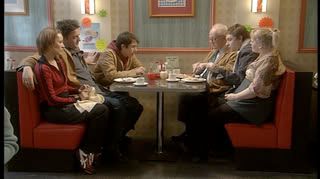 Episode Breakdown Disc One: Series One: 1. ‘Nice’ 2. ‘Naked’ 3. ‘Bondage’ 4. ‘Finger’ 5. ‘Women’ 6. ‘Hutch’ Disc Two: Series Two: 1. ‘Bastard’ 2. ‘Big Foot’ 3. ‘Nude’ 4. ‘Loser’ 5. ‘Tony Two-Ways’ 6. ‘Celebrity’
Video
The series is presented in its original broadcast ratio of 1.78:1, with anamorphic enhancement. Shot on digital video in a studio setting, the presentation of the series is excellent; there are no problems whatsoever. 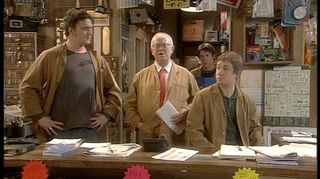 The original break-bumpers are intact. The retail version's DVD case indicates that some edits have been made 'for contractual reasons'. Full details of these edits are not available to us at this moment, but the episodes appear intact and so these edits may be nothing more than incidences of music replacement.
Audio
Audio is presented via a two-channel stereo track; again, there are no problems here. There are no subtitles.
Extras
There is no contextual material, which is a little sad. An interview with Nye or some of the other participants would have helped to ‘round out’ the package; it would be interesting to see how Nye and the performers feel about the series now.
Overall
Receiving a lukewarm critical reception in 2003, Hardware deserves to be re-evaluated; seeming somewhat reactionary on its original broadcast for its return to the traditional studio-based sitcom format, its back-to-basics approach is probably more in tune with current trends in British television situation comedy. (I have to confess that at the time of Hardware’s broadcast, I couldn’t understand some of the negative press that it attracted, which largely seemed predicated on the show’s defiance of the then-dominant trend for sitcoms to try to ‘break new ground’ within the format.) The series is witty, and the interplay between the characters demonstrates Nye’s keen eye for observational humour, especially in terms of the relationships that exist between male friends and colleagues. Hopefully this DVD release from Network will allow the series to find a new audience. Fans of current studio-based sitcoms such as The IT Crowd and Not Going Out will most likely find much to enjoy here, and this is a highly-welcome DVD release for one of this century’s most overlooked situation comedies. References: Boyle, Karen, 2005: Media and Violence. London: SAGE Publications Davies, Máire Messenger, 2001: 'Dear BBC': Children, Television Storytelling, and the Public Sphere. Cambridge University Press Deans, Jason, 2004: ‘Office star returns to BBC’. The Guardian (23 September 2004): en Dowell, Ben, 2008: ‘The sitcom is dead. Long live the sitcom’. Guardian.co.uk: Media Guardian Edinburgh International Television. [Online.] http://www.guardian.co.uk/mgeitf/sitcom Flett, Kathryn, 2004: ‘And no funny business…’. The Observer (14 March 2004): en McMahon, Kate, 2008: ‘BBC and ITV call for more studio-based sitcoms’. BroadcastNow. [Online.] http://www.broadcastnow.co.uk/news/terrestrial/2008/08/bbc_and_itv_call_for_more_studiobased_sitcoms.html Merritt, Stephanie, 2004: ‘Tim for a change’. The Observer (22 February 2004): en Nye, Simon, 2003: ‘Anarchy in the UK’. The Guardian (19 February 2003): en Page, Simon et al, 2004: Mediascripts: Resourcing Media in the Framework for Teaching English. London: Heinemann Whannel, Garry, 2002: Media Sport Stars: Masculinities and Moralities. London: Routledge Williams, Zoe, 2003: ‘Nice and other four-letter words’. The Guardian (15 March 2003): en Yentob, Alan, 2006: ‘Inside story: The rebirth of the sitcom’. The Independent (20 January 2006): en For more information, please visit the homepage of Network DVD.
|
|||||

|